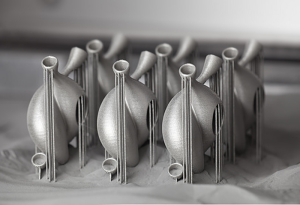Cardiff University in Cardiff, Wales, has been implementing 3D printing technology since the mid-1990s, using metal and plastic printing machines in their Additive Manufacturing Labs at the School of Engineering. The school has just added a new 3D printer to their line-up: the AM250 metal laser melting machine from Renishaw.
 The AM250 printer utilizes a ytterbium fiber laser to melt metal powders at thicknesses as fine as 20 microns and as large as 100 microns. Director and General Manager of Renishaw’s Additive Manufacturing Products Division, Simon Scott, believes that the machine, capable of producing fully dense parts, will complement the university’s machines greatly, saying, “Renishaw is delighted that Cardiff have chosen Renishaw additive manufacturing technology to accompany the already very extensive facilities. As with many new and disruptive technologies it is the collaborative relationship that fosters and supports the breakthroughs that lead to wider adoption and we are looking forward to a strong partnership to support this goal.”
The AM250 printer utilizes a ytterbium fiber laser to melt metal powders at thicknesses as fine as 20 microns and as large as 100 microns. Director and General Manager of Renishaw’s Additive Manufacturing Products Division, Simon Scott, believes that the machine, capable of producing fully dense parts, will complement the university’s machines greatly, saying, “Renishaw is delighted that Cardiff have chosen Renishaw additive manufacturing technology to accompany the already very extensive facilities. As with many new and disruptive technologies it is the collaborative relationship that fosters and supports the breakthroughs that lead to wider adoption and we are looking forward to a strong partnership to support this goal.”
Professor Rossi Setchi, responsible for high value manufacturing at the school, said of the acquisition, “Since the mid-1990s the Additive Manufacturing Laboratories at Cardiff School of Engineering have had a fantastic track record of additive manufacturing R&D in metal sintering, in resins, and in polymers. Our Additive Manufacturing Labs incorporate a wide range of 3D printing technologies and the ability to produce macro and micro components – we’re very excited to be able to add laser melting to this mix for the first time with the purchase of this Renishaw AM250 machine. This equipment combined with our pioneering expertise will advance R&D in the additive manufacturing field as well as enabling research and development in a very wide range fields from advanced manufacturing through healthcare to energy. Cardiff’s collaboration with a world-leading metrology company Renishaw, and new metrology facilities at Cardiff School of Engineering, allows our AM Labs immediate access to state-of-the-art measurement equipment in order to verify the dimensional accuracy of R&D and production laser melted components.”
We have yet to see what Cardiff will make with the new metal printer, but with the capability to 3D print metal components, it’s possible that the university could use the technology to 3D print parts for fields as diverse as aerospace and medicine.

Leave A Comment